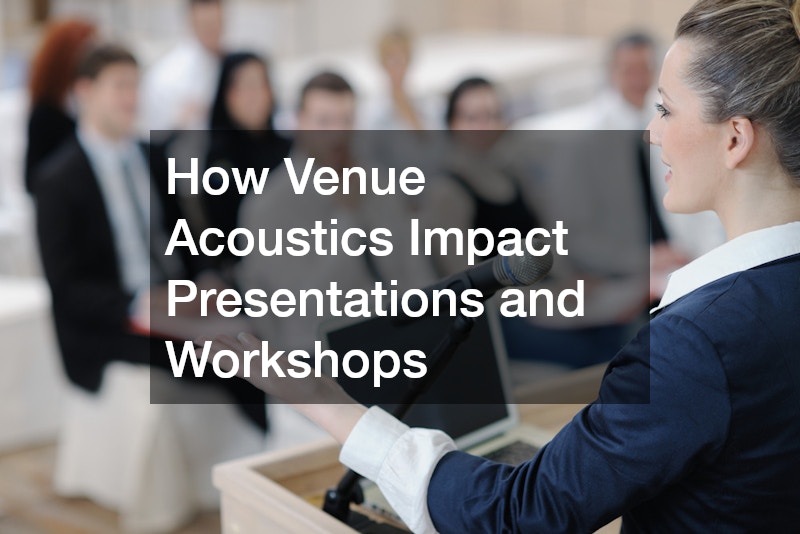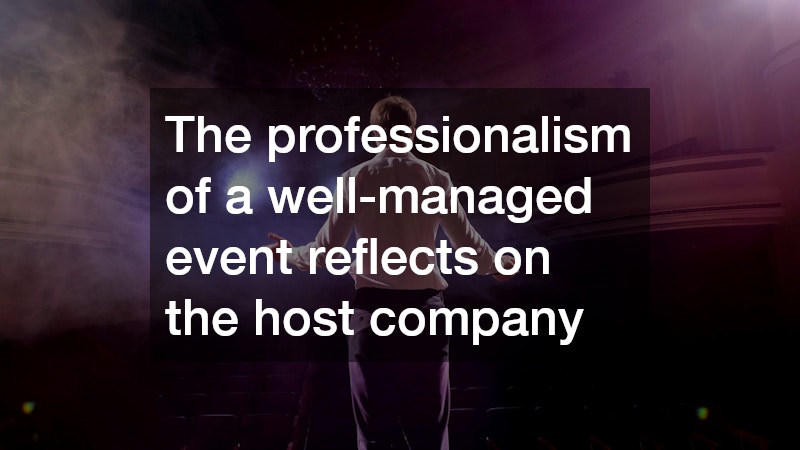Highlights:
-
Acoustics directly impact clarity, engagement, and learning in corporate events.
-
Poor sound quality undermines presentations, workshops, and speaker confidence.
-
Venues that specialize in corporate events often use design and materials to reduce echo and noise.
-
Good acoustics improve comprehension, participation, and overall event success.
-
Technology, such as microphones and distributed speaker systems, enhances sound clarity.
-
Event planners should prioritize venues with built-in audio solutions and soundproofing.
-
Investing in acoustics improves brand reputation, training efficiency, and ROI.

When planning a successful presentation, training, or workshop, many organizers focus on the content, speakers, visuals, and logistics. However, one often-overlooked factor has the power to elevate or completely derail the experience: acoustics. The sound quality in a venue determines whether attendees hear every word with clarity or struggle through distractions, echoes, and muffled tones.
For any venue that specializes in corporate events, acoustics are more than a background detail—they are a defining feature that influences audience engagement, comprehension, and overall satisfaction. This article explores how acoustics impact presentations and workshops, why they matter for corporate gatherings, and what businesses and planners should consider when selecting a venue.
Why Acoustics Matter in Corporate Settings
Acoustics—the way sound behaves in a room—directly affect how people absorb information. In corporate events, where communication is the core purpose, poor sound quality can undermine even the most well-prepared presentations.
-
Clarity of Speech: If words are lost to echoes or background noise, the message loses impact.
-
Audience Engagement: Attendees tune out when they cannot clearly hear or understand.
-
Learning Retention: Workshops rely on interactive communication; poor acoustics limit comprehension.
-
Professionalism: A venue with poor acoustics reflects badly on the organizers and brand.
Corporate events are investments in people—employees, clients, and stakeholders. The venue’s sound environment determines whether that investment delivers results.
The Role of Venue Design in Acoustics
Not all spaces are created equal when it comes to sound. A venue that specializes in corporate events is often designed with sound clarity in mind, incorporating materials and layouts that minimize distractions.
Key factors influencing acoustics include:
-
Room Shape: Rectangular rooms with high ceilings often cause echoes, while thoughtfully designed spaces distribute sound evenly.
-
Surfaces and Materials: Hard surfaces reflect sound; carpets, drapes, and acoustic panels absorb it.
-
Furniture Placement: Rows of chairs, tables, and partitions can either block or help diffuse sound.
-
Technology Integration: Built-in sound systems and microphones ensure consistent audio across the room.
A well-designed venue doesn’t just look good—it sounds good, too.
Common Acoustic Problems in Corporate Events
Even experienced planners can overlook sound challenges. Here are the most frequent issues businesses face when they don’t choose a venue equipped for corporate events:
-
Echo and Reverberation: Words become blurred, especially in rooms with glass, concrete, or marble surfaces.
-
Background Noise: Street sounds, HVAC systems, or nearby rooms disrupt concentration.
-
Uneven Sound Distribution: Some attendees hear clearly, while others in the back struggle.
-
Microphone Feedback: Poorly calibrated systems cause distracting screeches.
-
Muffled Speech: Lack of amplification makes it difficult to hear soft-spoken speakers.
Each of these problems reduces the value of the event, no matter how well the content is delivered.
Benefits of Good Acoustics in Presentations and Workshops

When a venue that specializes in corporate events prioritizes acoustics, the difference is noticeable. Sound clarity enhances every aspect of the event.
-
Improved Comprehension: Attendees retain more information when they can clearly hear.
-
Greater Participation: Workshops thrive on dialogue, which requires clear communication.
-
Stronger Branding: The professionalism of a well-managed event reflects on the host company.
-
Reduced Fatigue: Clear sound reduces mental strain and helps maintain focus.
-
Positive Feedback: Attendees are more likely to rate events highly when sound is crisp and reliable.
Ultimately, good acoustics create an environment where communication thrives—exactly what corporate gatherings are meant to achieve.
How Poor Acoustics Affect Speakers and Presenters
Presenters are often judged on delivery, but their performance can only be as strong as the venue allows. Poor acoustics make even skilled speakers struggle.
-
Strained Voices: Speakers may raise their voices to be heard, causing fatigue.
-
Lost Confidence: Unclear sound frustrates presenters, making them appear less competent.
-
Technical Disruptions: Constant adjustments to microphones or AV systems break flow.
-
Reduced Interaction: When audiences cannot hear questions or responses, participation drops.
A corporate event venue with optimized acoustics gives presenters the confidence to focus on content instead of sound issues.
Acoustics in Workshops: Why They’re Even More Critical
Workshops differ from traditional presentations because they depend on collaboration and conversation. Unlike lectures, workshops require participants to ask questions, share insights, and work in groups.
Poor acoustics hinder these dynamics:
-
Group Discussions Become Ineffective: Participants cannot hear one another clearly.
-
Collaboration Suffers: Team activities lose momentum when communication is difficult.
-
Learning Outcomes Decline: Workshops are designed for skill-building, which fails without clear sound exchange.
This is why companies seeking venues that specialize in corporate events should carefully assess how the space supports dialogue and group interaction, not just formal speeches.
The Science of Acoustics: Materials and Sound Absorption
Understanding the basics of sound behavior helps planners recognize the difference between an ordinary space and one designed for business events.
-
Absorptive Materials: Carpets, curtains, and upholstered seating absorb sound waves, reducing echo.
-
Reflective Surfaces: Glass, tile, and concrete bounce sound around the room, creating reverberation.
-
Diffusive Elements: Bookshelves, decorative panels, or angled walls scatter sound evenly.
-
Acoustic Treatments: Specialized wall panels and ceiling tiles specifically control frequencies.
Venues with these features offer consistent clarity no matter where attendees are seated.
Technology’s Role in Enhancing Venue Acoustics
Even the best architectural design benefits from professional sound systems. Many venues that specialize in corporate events provide built-in technology to ensure clear communication.
Essential features include:
-
High-Quality Microphones: Wireless, lapel, or headset options prevent interruptions.
-
Distributed Speaker Systems: Evenly spaced speakers ensure sound coverage throughout the room.
-
Noise-Canceling Systems: Reduce background noise from HVAC or external sources.
-
AV Control Panels: Allow staff to adjust volume and balance during events.
-
Hybrid Event Support: Microphones and cameras designed for streaming maintain clarity for remote participants.
Technology combined with good acoustics ensures a seamless experience for both live and virtual attendees.
What to Look for in a Venue That Specializes in Corporate Events
When selecting a venue, event planners should go beyond aesthetics and location. Acoustics must be part of the checklist.
Key considerations include:
-
Soundproofing: Does the venue block outside noise from streets or adjacent rooms?
-
Built-In Audio Equipment: Are professional microphones and speakers available?
-
Room Layout Options: Can the space adapt to both presentations and workshops?
-
Staff Expertise: Does the venue have trained AV staff on hand?
-
Test Run Opportunities: Can you test the sound before the event begins?
-
Acoustic Treatments: Are there panels, carpeting, or materials designed to enhance sound?
These details separate generic spaces from venues specifically designed for corporate success.
Real-World Scenarios: Acoustics Done Right vs. Wrong
To illustrate the difference, consider two scenarios.
Poor Acoustics Example:
A corporate training is held in a large hall with marble flooring and glass walls. Despite using microphones, the echo makes speech difficult to follow. Participants in the back struggle to hear, group discussions fall flat, and feedback reveals frustration with the venue.
Good Acoustics Example:
The same training is held in a venue with acoustic panels, carpeting, and a distributed speaker system. Speech is clear throughout the room, participants engage in small group discussions without shouting, and the event receives positive reviews.
The content and presenters were identical—the difference came down to venue acoustics.
How Venues Can Improve Their Acoustics
For venues looking to attract more corporate clients, investing in acoustics is one of the most effective strategies. Improvements can include:
-
Installing acoustic wall panels to reduce echo.
-
Adding carpets, rugs, or upholstered furniture for sound absorption.
-
Using ceiling baffles to control sound in high-ceiling rooms.
-
Ensuring doors and windows are sealed to block outside noise.
-
Offering portable sound systems for flexible setups.
-
Hiring trained AV technicians to manage events.
By prioritizing these upgrades, a venue strengthens its reputation as a reliable space for corporate gatherings.
Tips for Event Planners to Maximize Acoustics
Even in a venue designed for corporate events, planners can make adjustments to optimize sound quality:
-
Conduct a Sound Check: Test microphones and speakers before attendees arrive.
-
Arrange Seating Thoughtfully: Position chairs and tables to support even sound distribution.
-
Limit Background Noise: Ask the venue to turn off loud HVAC systems if possible.
-
Select the Right Microphones: Choose lapel or headset mics for workshops to maintain clarity.
-
Educate Presenters: Remind speakers to project their voices and stay near microphones.
These proactive steps ensure a smoother, more professional event.
The Business Case for Acoustic-Friendly Venues
For businesses, choosing a venue that specializes in corporate events is not just about convenience. It directly impacts ROI.
-
Training Efficiency: Employees retain more knowledge, making workshops more cost-effective.
-
Client Impressions: Clients perceive the company as professional and detail-oriented.
-
Brand Reputation: High-quality events reflect positively on the business’s image.
-
Reduced Costs: Fewer technical failures mean fewer rescheduled sessions or refunds.
Investing in acoustics is, in reality, investing in communication—the foundation of every corporate event.
Final Thoughts
Acoustics are often invisible until they become a problem. For presentations and workshops, however, they are one of the most critical elements determining success. A venue that specializes in corporate events understands this and designs spaces where communication is effortless, engagement is natural, and professionalism shines through.
When selecting your next venue, don’t just ask about capacity, catering, or décor. Ask about sound. Because in the world of corporate events, what people hear—and how well they hear it—makes all the difference.
